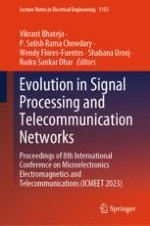2024 | OriginalPaper | Buchkapitel
Increasing Lifetime Using Modified LEACH Protocol and Optimal Selection Routing in Wireless Sensor Networks
verfasst von : G. Spica Sujeetha, Ch. Murali
Erschienen in: Evolution in Signal Processing and Telecommunication Networks
Verlag: Springer Nature Singapore
Aktivieren Sie unsere intelligente Suche, um passende Fachinhalte oder Patente zu finden.
Wählen Sie Textabschnitte aus um mit Künstlicher Intelligenz passenden Patente zu finden. powered by
Markieren Sie Textabschnitte, um KI-gestützt weitere passende Inhalte zu finden. powered by
